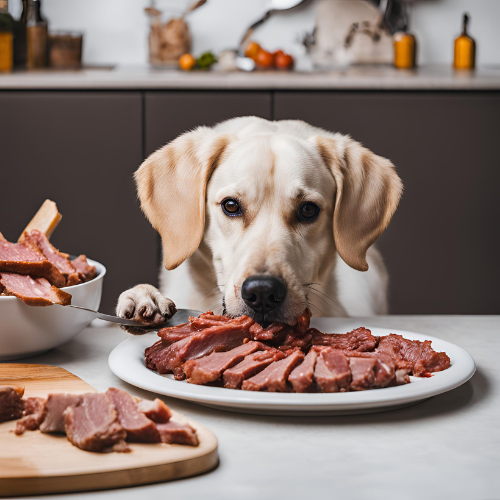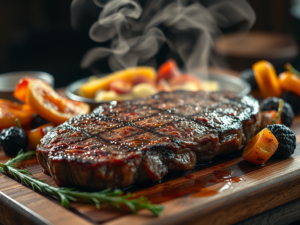Why Your Dog Needs to Eat Carnivore
Written by Luis on December 7th, 2024 | Updated 12/8/24
Although traditional dog food brands may list their kibble as “complete and balanced”, this may be far from the truth. In this article, we will go over what your dog really needs to thrive and get their health and energy back.

What are we feeding our dogs?
It’s true that dogs have evolved to tolerate certain types of grains due to their evolution with humans. However, this does not mean they will thrive and reach their best health potential on a grain based diet. Millions of dogs over the world eat a grain based diet, yet, illnesses and health degration in dogs is at an all time high and increasing.
Grain-based dog food
Dogs are not meant to thrive on grains. Modern dry dog food- better known as kibble, is an ultra-processed food and is the most common meal for the average American dog. Nearly every bag of dry dog food in the US contains corn, oats, wheat, or rice as the main ingredient. Take a quick look at the ingredients list in your dog’s kibble!
Although grain-based kibble makes a convenient meal and most dogs may tolerate it, living off mostly grains may not be optimal for your dog:
- Grain-based kibble contains 30%-60% carbohydrates, promoting obesity
- Additives, preservatives, and flavorings in commercial kibble strain both the kidneys and liver and may lead to inflammation.
- Deviating from their evolutionary diet places metabolic stress and potential long-term health issues
Chronic illness and physical health
Modern dogs are seeing an increase in chronic disease and illness. Although lifestyle factors and living conditions play a role, they consider what they’re eating.
As dogs age, they may present the following issues:
- Decaying or rotting teeth and bad breath
- Reduction in liver and kidney function
- Poor skin and fur health
- Low energy and behavioral issues
Although age-related issues are a common phenomenon in mammals, it’s important to take into consideration that their diet full of processed food may be hurting our dogs in the long run.
Dogs are meant to thrive on meat
Dogs are facultative carnivores, meaning they’re designed to thrive on animal proteins and fat. Although their digestive system has evolved to digest plant foods like grains, they are not meant to thrive on plant food and plant proteins.
- Short digestive tract: Their short digestive tracts are better suited for breaking down meat.
- Lack of salivary enzyme – amylase. Amylase is an enzyme in the saliva that breaks down carbohydrates in the mouth. Although humans evolved to tolerate certain plant foods (which isn’t optimal for long-term health), dogs are less optimized to live on a plant-based diet.
Benefits of switching to a meat-only diet
Although modern research on dogs is limited, there are many instances where owners share their experiences when their dogs adapt to a carnivore diet. Many dog owners anecdotally report that, upon switching their dog to a meat-only diet, they observe that their dogs may benefit from the following.
Increase in energy and overall vitality
When dogs adapt to their ancestral-appropriate carnivore diet, they may show signs of increased playfulness, better stamina, speed, agility, and strength, according to many anecdotal reports from pet owners.
A study from Epilepsy & Behavior suggests that dogs following a ketogenic diet like the carnivore diet tend to improve in energy levels, focus, and anxiety relief.
A dog owner from Reddit reported that their eleven-year-old dog had an increase in energy levels, managed a healthy weight, and sustained 8-10 mile runs three years into a carnivore diet.
Improve joint pain
Dog owners also report improved joint pain in older dogs fed a carnivore diet. This is due to the rich nutrient profile of high-quality, bioavailable animal proteins, collagen, and gelatin found in meat.
Also, your dog may see a reduction in chronic inflammation due to the anti-inflammatory properties of fatty meat organs and being fat-adapted (ketogenic state). This, in return, reduces inflammation at the joints that might lead to pain.
Better skin and fur
The carnivore diet is rich in collagen, amino acids, and animal fat, which supplies all the necessary building blocks to support your dog’s skin and fur health by supporting the following:
- Hydrated skin and fur
- Shedding and dandruff control
- Fur growth, strength, and color
Improved dental health
Dog jaws and teeth become stronger when chewing on bones, hide, and dried meats. However, a grain-based diet mostly provides crunchy foods and carbohydrates, which, without proper dental care, can result in tooth decay, bad breath, and poor gum health.
The carnivore diet may help with dental health due to the following:
- Chewing on raw bones may help remove plaque and tartar.
- Elimination of sugar: Grains in commercial kibble are broken down into glucose, spiking insulin and blood sugar, which contributes to poor dental health and cavities.
Behavior improvements
Dogs with ADHD-like symptoms and anxiety may see major improvements on a carnivore diet. Another study by
Improvement in cancer and tumors
Research by Frontiers in Nutrition suggests that a ketogenic diet, like a carnivore, can slow cancer progression and inhibit tumor growth in dogs. The 7-year-old pitbull, in this case, had a complete regression of a tumor over several months on a strict, carbohydrate-free diet.
The dog’s diet was first changed from grain-based dry dog food to a raw vegetable and fish diet. After seeing little improvement, a final switch was made to a strict carnivore diet composed primarily of poultry.
What foods should I be feeding my dog?
Besides sharing your meat leftovers with your dog, these are the foods that will best support your dog’s overall health and longevity.
Whole meats and poultry
- Any type of beef, including ribeyes, sirloin, chuck roast, brisket, ground beef, and organs
- Pork: Pork chops, spare ribs, pork belly, chicharrones, and bacon
- Lamb: Lamb chops, ground lamb, and organs
- Poultry: Chicken thighs (with bone), drumsticks, wings, breast and any piece of chicken
- Game meats: Any cut of venison, bison, elks, deer, or most game based on where you hunt
- Packaged meat snacks, including beef jerky, venison jerky, pork rinds, and pork belly. Be mindful of added preservatives, artificial ingredients, and sugar.
Seafood and shellfish
- Fish like salmon, tilapia, cod, mackerel, trout, and other fish.
- Shellfish, including shrimp, crabs, lobsters, oysters, clams, and mussels
You may include some processed meats like sliced deli meats (sliced ham, turkey, chicken), breakfast sausage, and canned meats. Just ensure they’re low or free from preservatives, additives, sugar, and sweeteners.
Note: Dairy is not listed since some dogs may be lactose intolerant or sensitive to dairy products.
Tip: Cook with animal fats such as beef tallow, pork or bacon lard, duck fat, and even butter or ghee for healthy saturated fats you and your dog need.
Conclusion
Although dogs have evolved to tolerate certain plant foods, they are designed to thrive on animal proteins and fats. Switching your dog from commercial dog food to a carnivore diet may lead to improvements in energy levels, behavior, skin and fur health, and dental health.
Note: This is not veterinary advice. Consult with your vet before switching your dog’s diet, especially if on medications or treatments.




